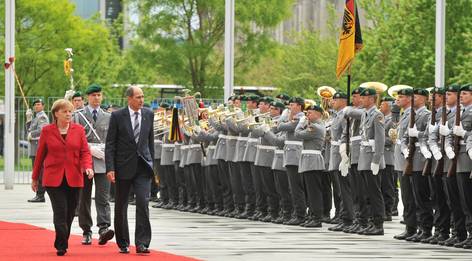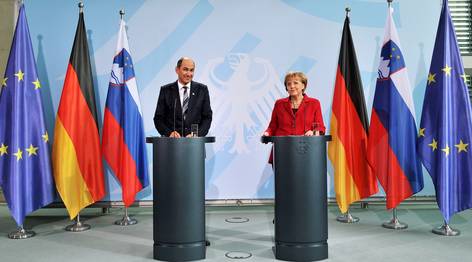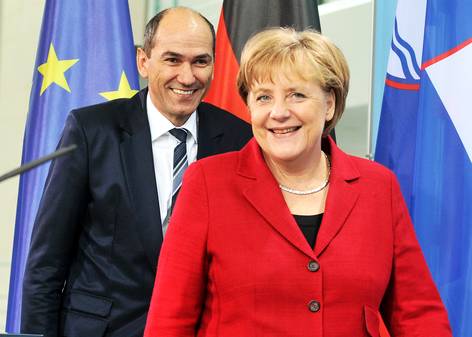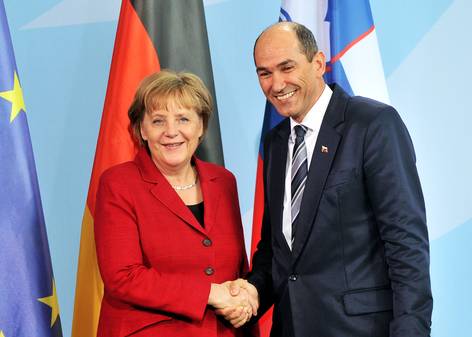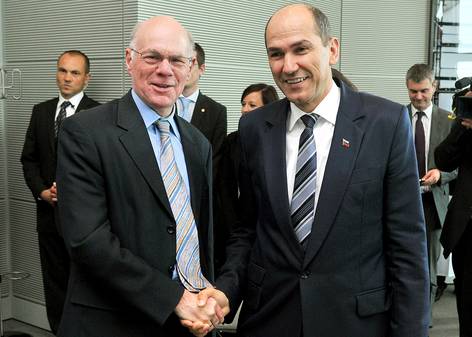NEWS
Slovenian Prime Minister Janez Janša: Fiscal stability and economic recovery are not mutually exclusive
The Slovenian Prime Minister, Janez Janša, today continues his official visit to the Federal Republic of Germany, which symbolically takes place on Europe Day and coincides with the 20th anniversary of the establishment of diplomatic relations between Slovenia and Germany. After a working meeting with the German Chancellor, Angela Merkel, Prime Minister Janez Janša highlighted at a press conference the need for sustainable development to stabilise the public finances and said that the dilemma presented in the last few days – either the growth or stabilisation of public finances – does not really exist.
At the press conference, the Slovenian Prime Minister first congratulated the German Chancellor for the great achievements of the Federal Government in these times of economic volatility. He went on to emphasise that not only is Germany a friendly country to Slovenia, but is also its most important economic partner. "In recent times, trade between the two countries reached nearly EUR 10 billion and has been increasing despite the current crisis, which is of particular importance for Slovenia since it is far more affected by the crisis than Germany," the Prime Minister explained, and emphasised that Slovenia is currently trying to improve and establish a business environment that would be more attractive for foreign investment. In this regard, he pointed out that some steps have already been taken in this direction, but there is still some way to go. At the same time, the Prime Minister stressed that the Slovenian National Assembly is currently adopting probably its most important decisions in recent years, which are intended to offset the Slovenian public finances in a relatively short time and allow for further economic growth. In his opinion, generating economic growth solely through increasing debt is irresponsible and means borrowing at the expense of future generations.
In a joint statement to the media, he said that both Germany and Slovenia have similar views on key issues related to the financial crisis in Europe. "Fiscal stability is a prerequisite for normal operations, economic growth and planning ... without this stability it is not possible to plan for a positive future." He also stressed that we need to come to terms with the fact that we can spend only as much as we earn, and that agreements and rules are there to be respected. "The rules must be clear, should apply to all, and we all have to respect them. Therefore, Slovenia was among the first countries to ratify a fiscal pact in its parliament, which is a measure not only for the stability of the euro zone, but a measure to be implemented in every country in the euro area for the protection of taxpayers, so that they would not be forced to pay bills which they did not create." He further stated that, in the case of Slovenia, the Government is making every effort to re-start economic growth, which will allow us to keep pace with the average rate of development in the European Union.
"We are aware that there is no easy way out of this crisis, but there are many false prophets, and we do not intend to follow them," the Prime Minister declared in his statement. Agreements and contracts at EU level must be respected, and the agreements reached after tough negotiations ratified and implemented as soon as possible. In recent years, Slovenia has not been a very reliable partner with regard to balancing its public finances, but we are now making every effort to correct this.
Finally, the Prime Minister also drew attention to the statement published by the European Commission on 9 May, on the occasion of Schuman Day, whereby it notes that there is no conflict between saving and economic growth. "We all know that exiting from the crisis requires new jobs and that creating these is the best social policy. Slovenia is aware of the advantages of this good practice, and we believe that such a response will restart growth in the European Union as a whole. We are optimistic, but optimism is based on good role models such as Germany," the Prime Minister concluded.
As part of his official visit to the Federal Republic of Germany, Prime Minister Janez Janša met with the President of the German Bundestag, Norbert Lammert. They both agreed that relations between the two countries were very good, but that cooperation could still be enhanced in certain areas. They stressed that economic growth must be built on realistic foundations, and that agreements and contracts adopted at EU level must be taken into consideration, with everybody observing the same rules. They agreed that firm budgetary policy was the best way to prevent stagnation and boost economic growth. The President of the Bundestag, Norbert Lammert, stressed that fiscal balance and a balanced budget are the preconditions for economic growth, as evidenced by Germany's development over the last ten years.




